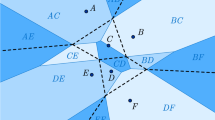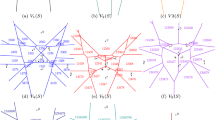Abstract
The order-k Voronoi diagrams are difficult to construct because of their complicated structures. In traditional algorithm, production process was extremely complex. While discrete algorithm is only concerned with positions of generators, so it is effective for constructing Voronoi diagrams with complicated shapes of Voronoi polygons. It can be applied to order-k Voronoi diagram with any generators, and can get over most shortcomings of traditional algorithm. So it is more useful and effective. Model is constructed with discrete algorithm. And the application example shows that the algorithm is both simple and useful, and it is of high potential value in practice.
Access this chapter
Tax calculation will be finalised at checkout
Purchases are for personal use only
Preview
Unable to display preview. Download preview PDF.
Similar content being viewed by others
References
Voronoi, G., Nouvelles: Applications des parameters continues a la theories des forms quadratiques. Premier Mémoire: Sur quelques Proprieteés des formes quadratiques positives parfaits. J. Reine Angew, Math. 133, 97–178 (1907)
Clarkson, K.L.: New applications of random sampling in computational geometry. J. Discrete and Computational Geometry 2, 195–222 (1987)
Sud, A., Govindaraju, N., Gayle, R., Dinesh Manocha, Z.: Interactive 3D distance field computation using linear factorization. In: Proceedings of the 2006 Symposium on Interactive 3D Graphics and Games, Redwood City, California, pp. 14–17 (2006)
Qian, B., Zhang, L., Shi, Y., Liu, B.: New Voronoi Diagram Algorithm of Multiply-Connected Planar Areas in the Selective Laser Melting. J. Tsinghua Science & Technology 14, 137–143 (2009)
Aurenhammer, F., Drysdale, R.L.S., Krasser, H.: Farthest line segment Voronoi diagrams. Information Processing Letters 100, 220–225 (2006)
Chen, J., Zhao, R., Li, Z.: Voronoi-based k-order neighbour relations for spatial analysis. J. ISPRS Journal of Photogrammetry and Remote Sensing 59, 60–72 (2004)
Lee, I., Lee, K.: A generic triangle-based data structure of the complete set of higher order Voronoi diagrams for emergency management. Computers, Environment and Urban Systems 33, 90–99 (2009)
Cabello, S., Fort, M., Sellarès, J.A.: Higher-order Voronoi diagrams on triangulated surfaces. J. Information Processing Letters 109, 440–445 (2009)
Wu, Y., Zhou, W., Wang, B., Yang, F.: Modeling and characterization of two-phase composites by Voronoi diagram in the Laguerre geometry based on random close packing of spheres. Computational Materials Science 47, 951–996 (2010)
Ferenc, J.-S., Néda, Z.: On the size distribution of Poisson Voronoi cells. Physica A: Statistical Mechanics and its Applications 385, 518–526 (2007)
Author information
Authors and Affiliations
Editor information
Editors and Affiliations
Rights and permissions
Copyright information
© 2010 Springer-Verlag Berlin Heidelberg
About this paper
Cite this paper
Zhao, Y., Liu, Sj., Tan, Yl. (2010). Discrete Construction of order-k Voronoi Diagram. In: Zhu, R., Zhang, Y., Liu, B., Liu, C. (eds) Information Computing and Applications. ICICA 2010. Lecture Notes in Computer Science, vol 6377. Springer, Berlin, Heidelberg. https://doi.org/10.1007/978-3-642-16167-4_11
Download citation
DOI: https://doi.org/10.1007/978-3-642-16167-4_11
Publisher Name: Springer, Berlin, Heidelberg
Print ISBN: 978-3-642-16166-7
Online ISBN: 978-3-642-16167-4
eBook Packages: Computer ScienceComputer Science (R0)




